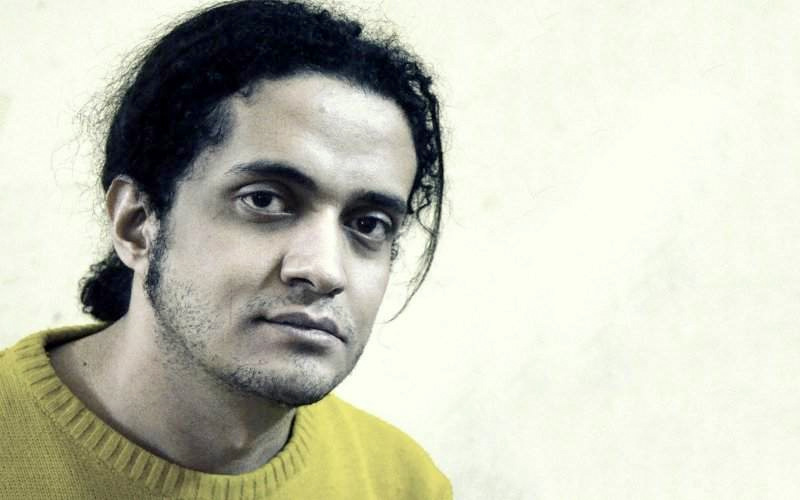International Writers & Artists Protest Saudi Plans To Execute Palestinian Poet
Renowned author Irvine Welsh hoped the campaign would put “pressure on governments who espouse democracy and freedom” to reconsider their dealings with Saudi Arabia.

Accused atheist and Palestinian poet Ashraf Fayadh. (Photo: Facebook)
RIYADH, Saudi Arabia — Just one week after Saudi Arabia killed carried out its largest mass execution since 1980, the monarchy announced plans to execute a prominent Palestinian poet.
On Jan. 2, Saudi Arabia executed 47 people across the country on trumped up terror charges, including political and human rights activists like Sheikh Nimr al-Nimr. Today, authorities announced that 32-year-old Ashraf Fayadh will face execution for apostasy this week.
News of his imprisonment and impending execution not only provoked uproar from human rights groups like Amnesty International, but also caught the attention of notable poets, authors and artists worldwide. On Thursday, hundreds of writers in 44 countries across the globe, including here in the United States, are taking part in coordinated readings to support of the imprisoned poet.
Irvine Welsh, author of “Trainspotting,” who will read at the Two Hearted Queen coffee shop in Chicago,told the Guardian he hoped the campaign would put “pressure on governments who espouse democracy and freedom to consider their actions in dealing with [Saudi Arabia].”
In solidarity with Fayadh, poems being read during the global campaign will include a selection from his 2008 book, “Instructions Within,” which Saudi religious police claim promotes atheism.
Organised by the International literature festival Berlin, the campaign hopes to place pressure on the United States and the United Kingdom to in turn pressure Saudi Arabia to halt the beheading, as well as to demand that Saudi Arabia improve its human rights record.
Last month, over 350 writers associations’ and authors’ signatures, organisers of the Berlin Festival took their action one step further by sending a letter directly to President Barack Obama, British Prime Minister David Cameron and Germany’s foreign ministry, asking them to intervene in the imprisoned poet’s case as well as demand that the U.N. suspend Saudi Arabia from the Human Rights Council until the country’s “abysmal record on upholding civil liberties improves.”
Why Saudi religious police targeted Ashraf Fayadh
The Palestinian artist and poet, who was born and raised in Saudi Arabia but resided there as a refugee, was arrested on August 6, 2013 following a complaint registered against him by another Saudi citizen who said Fayadh was promoting atheism and spreading blasphemous ideas among young people through his poetry.
Ashraf was released the next day, but then rearrested on January 1, 2014, when he was charged with apostasy for allegedly questioning religion and spreading atheist ideology through his poetry based on that single witness. He was at the same time also charged with violating the country’s Anti-Cyber Crime Law for allegedly taking and storing photos of women on his phone.
Last month, an appeal against the death sentence was filed by Abdulrahman al-lahem, a human rights lawyer, who told the Guardian that the allegations that Fayadh’s publicly blasphemed and promoted atheism to young people were “uncorroborated.”
The appeal goes on to state that the allegation of apostasy made by Shaheen bin Ali Abu Mismar, who is believed to have had a personal dispute with the poet at a cafe, “was not corroborated by other evidence, which goes against the principles of Islamic sharia law.”
Christof Heyns, the U.N. special rapporteur on extrajudicial, summary or arbitrary executions, stated, “It appears that Mr. Ashraf is about to be executed on the basis of seemingly unreliable evidence to the effect that he exercised his freedom of expression after an unfair trial. This has to be deplored as an arbitrary and thus unlawful execution.”
And Amnesty International condemned Saudi Arabia for denying Fayadh access to a lawyer, a violation of international human rights laws and even Saudi national law. In an “Urgent Action” report titled “Poet faces death for apostasy in Saudi Arabia,” Amnesty International details Saudi Arabia’s disturbing death penalty record:
“Saudi Arabia is one of the most prolific executioners in the world, putting more than 2,200 people to death between 1985 and 2015. Since 2012, the Saudi Arabian authorities have been persecuting human rights defenders, civil society activists and critics with complete impunity, using both the courts and extrajudicial means such as the imposition of travel bans.”
Human Rights Watch reported that the Saudi monarchy, which heads the U.N. Human Rights Council, carried out over 158 executions in the last year, with beheadings reaching their highest level in two decades.
Adam Coogle, Middle East researcher for Human Rights Watch, told the Associated Press that Saudi Arabia had executed “almost twice as many people in 2015 as the year before.” The disturbing figure is second only to 1995, when Human Rights Watch reported that the Gulf kingdom executed 192 people.
No comments:
Post a Comment